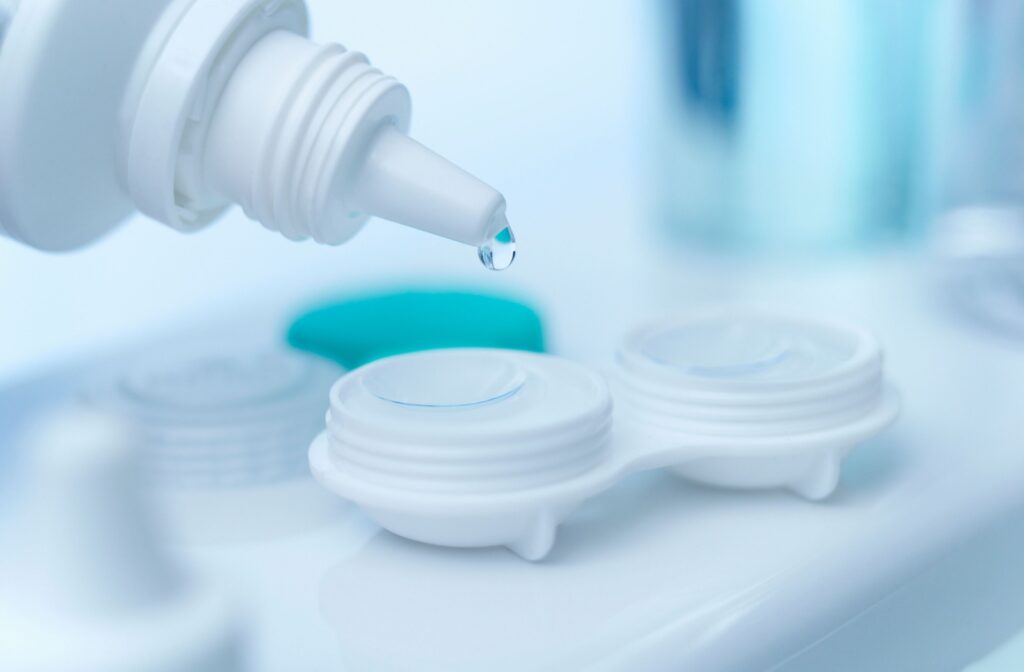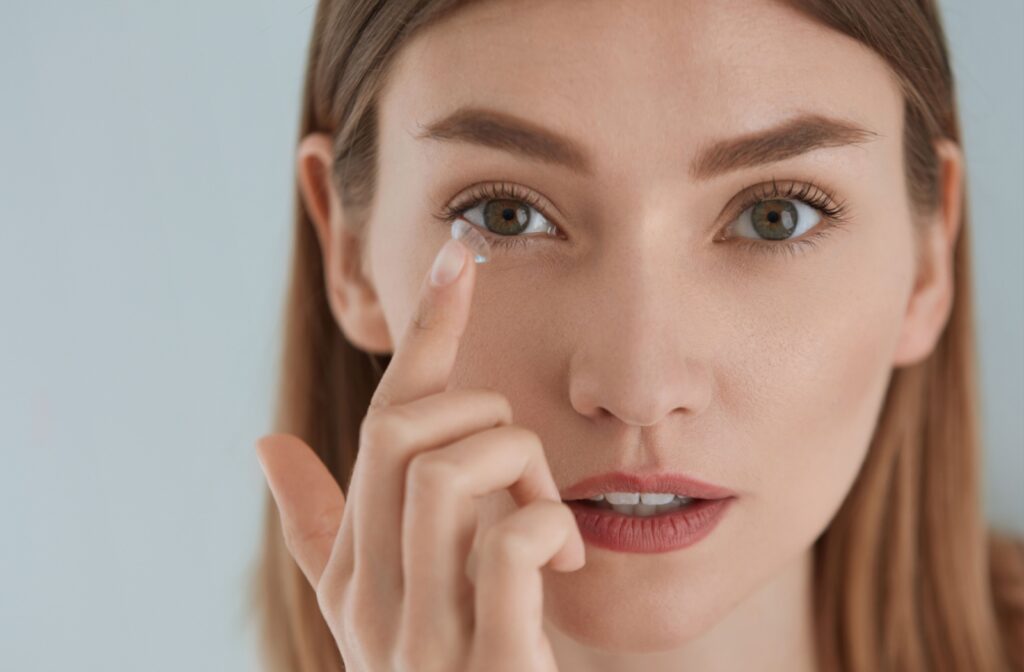You might think that having dry eyes means you have to give up contact lenses for good. This is a common concern, especially when you feel that gritty, scratchy sensation that often comes with dryness.
The good news is that, with the right approach and a proper contact lens fitting, contact lenses are often still an option for people with dry eye. It often comes down to the specific type of lens, a personalized care routine, and a comprehensive eye exam.
What Is Dry Eye & How Do Contacts Affect It?
Dry eye is a common condition that occurs when your tears can’t provide enough moisture, either because your eyes don’t make enough tears or because those tears are of poor quality.
Healthy tears have a balanced mixture of water, oil, and mucus that keeps the surface of your eye smooth and clear. When this balance is off, your tears don’t work as intended, and you may experience discomfort and irritation. Contact lenses can sometimes worsen these effects.
Common Symptoms Of Dry Eye
If you have dry eye, you might notice a few different symptoms. These can range from mildly annoying to quite disruptive. You may experience:
- A stinging or burning feeling
- Redness in your eyes
- A scratchy or gritty sensation, like something is in your eye
- Sensitivity to light
- Watery eyes—which is the body’s response to irritation
- Blurry vision that comes and goes
How Contact Lenses Can Contribute to Dryness
Contact lenses rest right on your cornea, where they interact with your tear film all day. Some soft lenses, particularly older types, can act like a tiny sponge and absorb the natural moisture from your eyes.
Contact lenses also reduce the amount of oxygen that reaches the surface of your eye, which may contribute to dryness and irritation.
Find The Right Contact Lenses for Dry Eyes
Not all contact lenses are made the same, and technology has come a long way. If you experience dryness, certain types of modern lenses are designed to help your eyes stay more comfortable and hydrated. A professional contact lens fitting with your eye doctor is a great step toward finding the best contacts for sensitive eyes.
During a fitting, your eye doctor looks at more than just your prescription. They assess your eye’s shape, your tear film, and your lifestyle to recommend a lens that matches your needs. This personalized approach can make a huge difference in comfort.
Lens Features That Help
Modern contact lenses have features specifically designed to help with dryness. Your optometrist may suggest lenses that offer:
- Low Water Content: It sounds counterintuitive, but lenses with lower water content need less moisture from your eyes to stay hydrated. This can help your eyes feel less dry by the end of the day.
- Daily Disposables: A fresh pair of lenses each day prevents the buildup of protein deposits that can cause irritation and dryness. Plus, there’s no need for cleaning solutions that can sometimes cause sensitivity.
- Silicone Hydrogel Material: These lenses are highly breathable. They allow much more oxygen to pass through to your eye, which helps keep it healthy and can improve comfort.
Specialized Contact Lens Options
For those with more persistent dry eye, there are also options beyond standard soft lenses:
Scleral Lenses
Scleral lenses are larger-diameter gas permeable lenses that are often well-suited to very dry eyes. These lenses vault completely over the cornea—the front part of your eye—and rest on the less sensitive white part, the sclera. This design creates a reservoir of tears between the lens and your cornea, keeping it constantly moisturized and protected all day.
Orthokeratology (Ortho-K)
Ortho-k is another potential approach for people who experience dryness with daytime lens wear. Ortho-k involves wearing special gas permeable lenses overnight while you sleep. These lenses gently reshape your cornea, so you can see clearly during the day without any contacts or glasses.
Because you don’t wear lenses during the day, your eyes can rest and recover from potential irritants and dryness..

Tips for Comfortable Contact Lens Wear
Beyond choosing the right lens, simple daily habits can make a significant difference in how your eyes feel. Small adjustments to your routine can help you manage dryness and wear your lenses more comfortably. Think of it as supporting the work your new lenses are doing.
Choose The Right Contact Solution
Not all contact lens solutions are the same, and some are better suited for sensitive eyes. Some formulas contain preservatives that can cause irritation. Talk with your eye doctor about which solution is a good match for you.
Use Rewet Drops
Lubricating eye drops, also known as artificial tears, can offer quick relief for dry eyes. It’s important to use drops that are specifically labeled as safe for use with contact lenses. Other types of drops can damage your lenses or cause more irritation, so always check the label.
Practice Good Lens Hygiene
Keeping your lenses clean is one of the easiest ways to support comfortable wear. Good hygiene helps prevent deposit buildup that can lead to irritation and dryness. Following guidelines for proper contact lens care is essential.
- Always wash your hands with soap and water before you handle your lenses.
- Stick to the replacement schedule your doctor recommends, don’t wear lenses longer than you should.
- Clean your lens case with solution (not water) and let it air dry. Replace your case every three months.
- Gently rub and rinse your lenses with fresh solution before you store them to remove buildup.
Other Ways to Manage Dry Eye
Managing dry eye symptoms often involves a comprehensive approach that goes beyond your contact lenses. Here some simple lifestyle changes you can make to help with dry eye::
- Take regular breaks from digital screens with the 20-20-20 rule—every 20 minutes, look at something 20 feet away for 20 seconds.
- Use a humidifier in your home or office to add moisture to the air.
- Stay hydrated by drinking plenty of water throughout the day.
- Consider a diet with omega-3 fatty acids, found in fish and flaxseed, which can support tear production.
When Your Eyes Are Too Dry for Contacts
Some days, your eyes may just be too tired or irritated to comfortably wear contacts. On these days, it’s a good idea to switch to your glasses. This gives your eyes a break and a chance to recover without the added stress of contact lenses.
Your Path to Comfortable Vision
Living with dry eyes doesn’t mean you have to say goodbye to contact lenses. The key is finding a contact lens that works for your eye health situation.
A thorough contact lens exam is the first step. Here at Total Vision Financial District, we can perform a dry eye assessment and recommend options that fit your needs. If you’re looking for an eye doctor in San Francisco, we’re ready to help you on the path to more comfortable vision.
Schedule a consultation today to explore your options.



